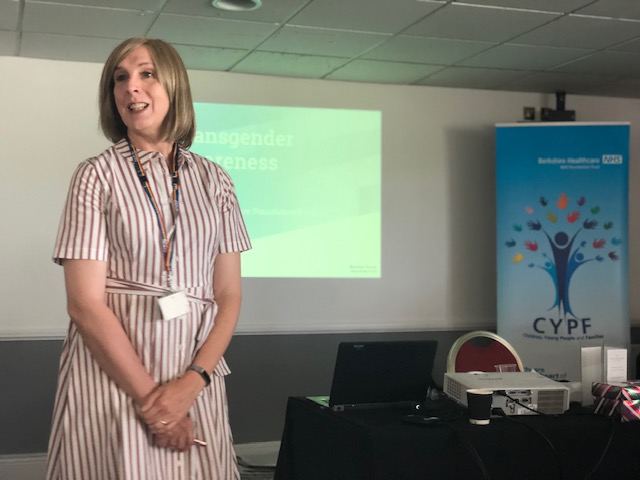Training our team to support trans people better

Berkshire Healthcare’s Children, Young People & Family Services (CYPF) team recently held a series of ‘Away Days’ featuring an introduction to Trans Awareness, presented by Rosemary Taylor, who transitioned whilst working as a teacher at Willow House.
The training is intended to help us to support trans people and responds to the increasing number of young people within our care who are questioning their gender identity.
Karen Cridland, Director, Children, Young People & Family Services (CYPF), explains: “Within CYPF services, we are working with an increasing number of young people who are questioning their gender identity. We wanted to have some training and development to enable us as a service to support these young people and were delighted to have some initial training at our three ‘Away Days’ with Rosemary Taylor.”
“After coming out as trans and then transitioning while working in Willow House, she has set out to pass on her own experiences and those of the many other trans people she has met, so that people can come to understand how we can all work together in a better way. Rosemary was an inspirational speaker with a great sense of humour, who welcomed any questions (as she stated she is a teacher of teenagers) with no subject being taboo.”
“Her session has left our teams wanting more, but has also given us more confidence in supporting young people questioning their gender identity.”
In her frank and honest presentation, Rosemary helped to explain how trans people experience the world, the breadth of experiences the term covers, and the terminology and language that trans people generally prefer.
Her guidance is beneficial for any one concerned about how to respond appropriately to trans people, whether they be friends, colleagues or patients.
Rosemary generously-described her own experiences, movingly explaining that before she transitioned she felt testosterone was ‘a poison to’ her. She also explained how hurtful and aggressive miss-gendering (people intentionally using the incorrect pronoun) can be, explaining: “If people call me Sir, I have a bad day. For others it is tragic, it is absolutely destroying.”
She also described her poor experience as a patient, when she was laughed at by a receptionist and called ‘Sir’ by a consultant after he had examined her.
These experiences demonstrate how insensitive people can be, perhaps through ignorance, awkwardness or aggression, and how difficult such encounters can be for people who don’t fit neatly into social stereotypes.
She explained how important it is to not make assumptions, explaining that some people may feel comfortable cross-dressing, but choose not to transition.
She also broached the often contentious subject of gendered spaces, such as toilets, stating it comes down to a choice: “Do I go into that one and get yelled at? Or that one and get beaten up.” She continued: “The number of assaults on trans people is huge. The number of sexual assaults of trans people is frightening. Is it therefore surprising that trans people have some of the highest rates of depression and high suicide rates, particularly amongst young people?”
She explained that many trans people suffer from anxiety because they feel that they don’t fit in. She explained: “My own self-image is that I am a big, great, hairy man, and that I stick out wherever I go.”
To anyone meeting Rosemary, this is clearly not the case, but demonstrates just how far removed our perceptions of others can be from the feelings they have about themselves.
She has, however, received tremendous support from her work colleagues and her GP, who has ensured that all her medical records record her as female. She explains that other computer systems can be problematic, continuing to present her past identity.
Highlighting the gravity of the decision to come out, Rosemary explained: “When we come out, we are risking everything, our friends, family, partners, community, job . . . We do not do this on a whim. It is just about the most difficult thing anyone can imagine doing.”
Feeling trapped and unable to fit in can do untold damage to mental health, as people suppress their feelings, often deciding to transition when their circumstances change, for example, after moving house and job, or perhaps when going to university.
Rosemary is working hard to help others understand what it is like to be trans. She recognises that people may be anxious that they will say the wrong thing and acknowledges that people will make mistakes. The ultimate indiscretion, the line that should never be crossed, is to ask people, “If they’ve had the op?” She emphasised: “It’s not socially acceptable to ask people about their genitals, so please don’t ask this of a trans person.”
Extremely personable and open to questions from delegates, Rosemary closed the ‘Trans Awareness Introduction’ by highlighting the value of our LGBT+ Network and the support that Allies can offer.